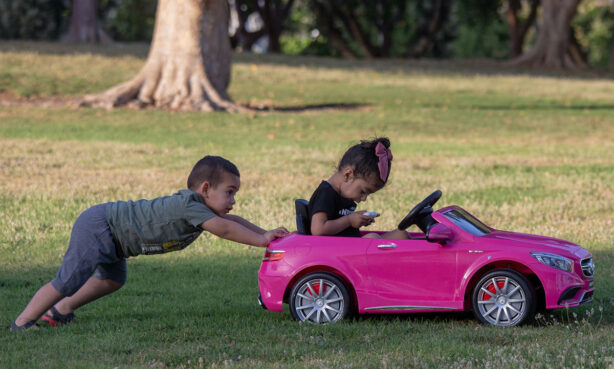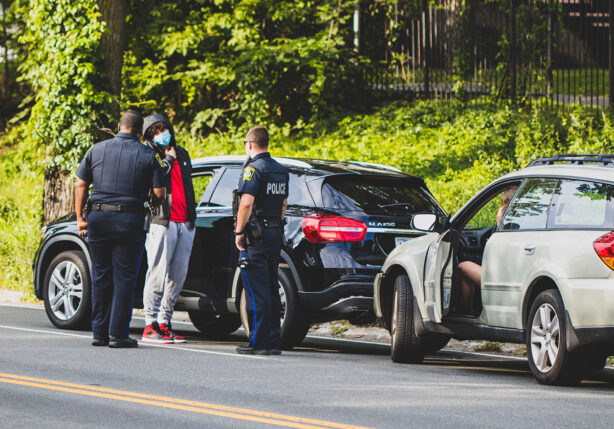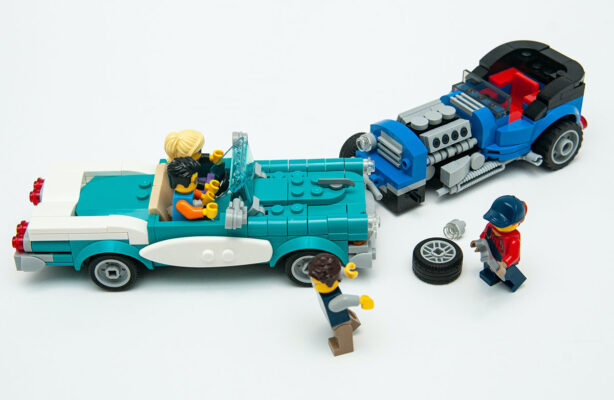Being involved in a car accident is always a frightening experience. And when your children are in the car, it can be even more stressful and horrifying.
Making sure our children are safe is a top priority for any parent. But, in a car accident, we simply don’t have any control over their wellbeing.

That’s why, as unpleasant as it can be to think about, being prepared and knowing what to do when you and your children are involved in a car accident is so important.
The initial emotional reactions to a car accident can range from shock to anger to fear. And those emotions are all intensified with your kids are in the back seat.
So, if you do end up in a car accident with your children in the vehicle, take a deep breath and follow these steps:
Check For Injuries
Before doing anything else, check yourself to determine if you’re hurt or in immediate danger. If you’re hurt, call emergency services before doing anything else.
However, if you’re okay, check on your children to see if they have any injuries. If they’re in a car seat, don’t take them out unless their immediate safety requires it.
Contact medical professionals if you notice any signs of injury, so a doctor can assess them in their car seat and treat them accordingly.
Once you get home, make sure to keep an eye on your children for the next week or so. Car accident specialists state there are some physical symptoms you should look out for if you experience a car crash with your children in the back seat.
If the kids experience two or more of the following symptoms, call a doctor immediately:
- Lack of strength
- Loss of consciousness
- Vision problems
- Restlessness
- Speech issues
- Vomiting
- Abnormal breathing
- Bleeding from mouth, nose, or ears
- Bowel irregularities
- Lack of interest in toys
If it’s determined that your child has suffered from any type of brain damage as a result of the crash, you may want to consult a brain injury lawyer to see if you’re eligible to have related medical costs covered.
Get To Safety
Once you’re sure your children have no injuries that require immediate assistance, move the car to a nearby driveway, side street, or parking lot, so you can get out safely and wait for the emergency services.
If your car is no longer drivable, stay in the car, talk to your children, and wait for help to arrive.
Put the hazard lights on to signal other drivers to avoid your car, and turn the engine off. If the situation requires leaving the car, move far away from the traffic to a spot where drivers can clearly see you.
Making sure you and your children are in a safe place is more important than anything.

Contact the Police
Regardless of the severity of the car crash, you need a record of the accident to apply for any potential compensation for your and your children’s injuries. Calling the police to report a car crash is the best way to follow the law and protect your family.
The police will also provide you with a complete report that shows who is at fault for the accident, something you’ll need if you’re eligible for compensation.
If you don’t know how much compensation you can get from a car accident, get an estimate from Compensation Calculator UK. Specialists created its compensation calculator tool to provide accident victims with reliable answers.
Monitor Your Child’s Reaction to the Crash
What do your children do immediately after the car accident? Believe it or not, it’s a good thing if your children cry after a crash, because it means the incident didn’t cause them to lose consciousness.
Keep an eye on their emotional behavior in the days after the accident as well, to determine if they’re having a hard time processing what happened.
Even if they have no physical injuries, their psychological health is as important as their physical health.
Children respond differently to aggressive events depending on their age, so keep this in mind when you try to determine how they handled the crash. Specialists state that:
- A child between the ages of 0 and 6 may become clingy and revert to behaviour from an earlier developmental stage.
- Kids between the ages of 6 and 12 may avoid talking about the incident, worry about the family’s well being constantly, or become combative towards their parents.
- Children between the ages of 13 and 18 may avoid social events that involve driving, find it challenging to focus on daily tasks or sleep, overanalyze their reaction to the car accident, suffer from mood swings, or avoid talking to you about the incident.
If your kids seem to be struggling, especially after some time has passed, then contact your family doctor and see if they might need additional emotional support.
Keep in mind that they’re most likely feeling shaken up after the crash, and may need some time to figure out how to respond to it.
Consult With a Lawyer
Your main focus after an accident is likely on your kids’ care, comfort, and wellbeing. And while your focus is elsewhere, an aggressive insurance provider may try to take advantage of the situation and push you into settling for less money.
Your children deserve full compensation for any pain and suffering, so consider consulting with a personal injury lawyer that’s willing to investigate the accident and identify the parties liable for causing it.
A lawyer can help ensure that any settlement is fair, and will be able to take the pressure off of you when dealing with insurance companies so that you can focus on yourself and your children.

Whether a car accident was minor or major, making sure that you and your children get the care you need is essential. So, make sure to take the time to record and monitor any issues after the fact, both physical and emotional.
And don’t forget that if the accident wasn’t your fault, you should look into potential compensation for both you and your children.
With a little support and some time, your family will be happily heading out on road trips again in no time.
